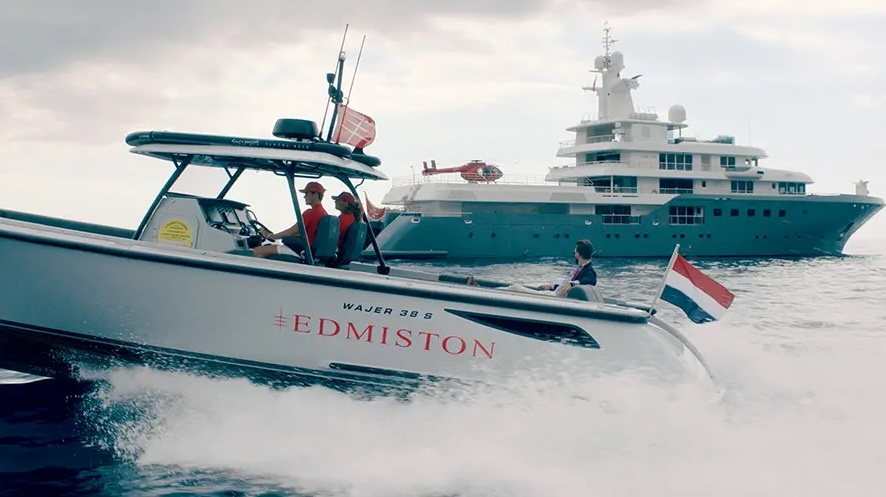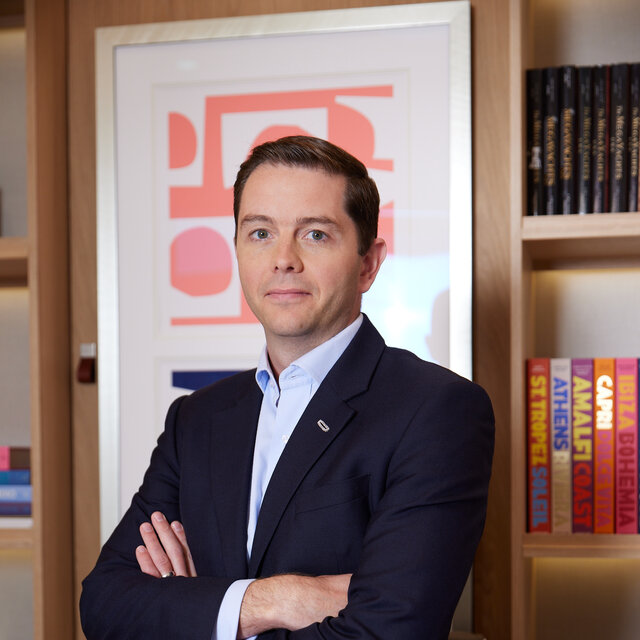Taking the rough with the smooth
For Jamie Edmiston, Alex Holden and Alex Koersvelt, grit, determination and teamwork form the bedrock of what it takes to be successful in yachting…

If there’s one thing that can be learned while working at a top superyacht brokerage is that everything can change in an instant. From deals collapsing moments before closing and last-minute charter requests to the more sinister prospects of war and global pandemics affecting the entire market, few things keep you on your toes more than a day in sales and charter. Success in this part of the industry relies on you sailing through both calm seas and stormy waters.
Seated in their riverside offices in London, I ask Jamie Edmiston, Chief Executive, Alex Holden, Strategy Director and Alex Koersvelt, Commercial Director about Edmiston’s strategy for being the industry’s top-performing brokerage, their view of the market over the past 12 months and forecast for the year ahead. Their response was unorthodox however, as the firm instead has adopted a long-term view approach to business – a year is but a drop in the ocean when looking at the industry through the lens of decade-long segments, and trends that appear dramatic over 12 months are often less severe when viewed in this context.
During my time with the three directors, we discussed everything from the reasons behind the company’s long-term view of industry trends, how it has benefited from data, marketing and partnerships, the background support that props up a successful enterprise and even how to run a pub. Throughout all of this, it became evident that their view on how the industry's future relies heavily on investing money, time and knowledge in the people who make it tick is of utmost importance to them personally.
The inescapable discussion of the effects of current and recent geo-politics on the market did not go amiss. “There was a lot of nervousness during the global pandemic, then as it came to be, our industry ended up becoming a beneficiary of the situations that came out of Covid, principally for two reasons. One, people realise that being on a yacht gives you, the buyer, security through health. And two, it gave you the freedom to travel,” explains Edmiston. “The other key factor was that wealthy individuals realised this was a great opportunity to invest in life, so in that sense, the situation worked out well for us and the industry.”
This post-Covid revelation isn’t the reason behind the firm’s success, however. According to Koersvelt, the company has excelled with a good cross-section of sales and charter over the past five years. So whilst the increase in Edmiston’s numbers may be somewhat bolstered by the boom felt by the entire market, Koersvelt maintains that a good portion of it is the result of the brokerage performing higher.
“The more established companies managed to benefit from the situation, perhaps disproportionately so,” he says. “But if you look at the statistics, we also performed well above average when you look at our peers for the same period. And it is not just over 2023 or the years prior to that. It results from having a team of individual brokers that have been in the business for a relatively long time, a positive internal dynamic and offering the right resources and platform for them to perform at their best.”
The company also avoided major exposure to the impact of the Russian sanctions, albeit with marginal effects on its charter operations as despite the firm not managing the larger yachts directly, there was less available inventory once they came off the market. This might surprise some, as the large-yacht segment where Edmiston typically operates is usually associated with Russian owners.
“One of the things we do to protect the business is to make sure that our client base is diverse, both in terms of nationality, industry, sector, etc,” says Holden. “This means that you're not overly reliant on anything. We are always making sure that the team are very focused and aligned, but also aware of what is happening in the world and its effects on the wider market. They then can use this knowledge to show value to their clients.”
Other geopolitical factors like the US election may cause a slowdown in the market in the future, however, with buyers tending to become more hesitant to close a deal ahead of a new president entering the Whitehouse. The instability of the global economy could accelerate a decline in the smaller segment of the market too, with Edmiston explaining that significantly fewer transactions coming out of the 2023 Monaco Yacht Show across the industry is illustrative of a slowdown.
“Having said that, we are a big believer in the data,” he continues. “If yachts are priced correctly, invariably there is a buyer as long as the market is moving. The challenge is when yachts are not priced correctly, they tend to sit on the market for a long time.” Koersvelt adds that this is where the pressure lies on the broker as a market maker to bring buyers and sellers together.

“It’s the disappointment business. If you can live with disappointment, then you can survive the yacht business,” says Jamie Edmiston.
The larger segments of the market are still active, however. According to Koersvelt, anything over 50 metres is still attracting interest from experienced buyers. This tends to be because not only are they educated on the benefits of the yachting lifestyle, usually being owners already, but are less affected by economic downturns due to their financial position. As larger boats are often newer, they hold their value better too.
“When it comes to the boats below 80 metres, it is all about age. How well has it been maintained? What is its pedigree?” says Edmiston. “A beautifully well maintained Feadship that has had a great budget, with a fantastic owner and crew is going to command a better price and be more liquid, than a poorly maintained Feadship of the same age that doesn’t have a good crew or budget. You could argue that they are both in the same boat, but they are markedly different.”
Data is core to the company’s valuations, although these figures sometimes fall short of what an owner may think their boat is worth in what Edmiston dubs as ‘vanity insanity’. Owners tend to believe their yacht is amongst the best in the world, and therefore price accordingly. Data will suggest that a yacht is worth €20 million, but an advisor might advocate for pricing it at €32 million and whilst there are anomalies to the rule, this results in the yacht remaining static on the market.
“It is frustrating at times where some of our colleagues in the industry will price deals at a level which isn’t an accurate reflection of what the yacht is worth,” says Edmiston. “We would rather not list a yacht at all than list it at a stupid price, because this eventually leads to an owner getting very frustrated at the fact that their yacht hasn’t sold.”
It also can negatively impact your reputation, adds Koersvelt. “We still maintain a track record of selling inventory twice as fast as the industry average. That is something we are focused on maintaining because when you have a conversation with an owner who is looking to sell and they perform their due diligence, it proposes quite a compelling argument.” Ultimately, owners might not initially like the fact their yacht has been priced lower than expected, but when presented with the data in black and white, most understand that opting to price their asset at a realistic figure is the most viable option for its selling within a respectable time frame.
Marketing has played a core feature in Edmiston’s success too. The new brand was launched on the jubilee of the America’s Cup on 18 August 2001. The principle behind the move was that the firm was selling expensive products and should therefore behave like a luxury brand. At a time when a lot of the industry was branded in blue, seagulls and compasses, Edmiston opted for a striking scarlet red. “When we started, there was a lot of Autotrader-type selling, and we did it slightly differently. Our brand is a way for us to consciously reaffirm the quality level that we stand for,” explains Edmiston. “This is a service-based business. So yes, we produce data and information and clients, but ultimately everything we do is about being a super premium brand with a strong identity.

Alex Holden explains: “By being super selective about brand partnerships means you can commit the time, effort and resources internally to make sure that you get the most out of them.”
Over the years, many people I have spoken to have hailed Edmiston’s rebrand and new approach to the brokerage sector through design, data and marketing as a watershed moment for the industry, with others following in their wake shortly after. The firm’s inter-industry partnerships are renowned too, with the brokerage forming strategic alliances with premium brands such as BMW, Land Rover, Airbus Helicopters and Gulfstream. All, namely the latter partnership, with Gulfstream being the behemoth private aviation wing of General Dynamics, have generated a significant number of clients for the brokerage.
As a private company, the firm presents attractive prospects for these partnerships and clients as decisions can be made on the fly, or at most a few days, making it nimbler than an organisation with shareholders. Holden says that this is one of the key reasons behind the partnership’s success. “Also, by being super selective about those partnerships, it means you can commit the time, effort and resources internally to make sure that you get the most out of them. Otherwise, you end up with a large portfolio of partnerships, but not enough time and resources to reach their optimum potential,” he adds.
Aside from data, rebranding, marketing and partnerships, the three executives unanimously agree that the backbone of its success ultimately lies in its people. A large proportion of the Edmiston team has been with the firm for over a decade, half of whom have served more than 15 years, with investment in upskilling all members as well as creating a support platform to optimise their performance. This has extended beyond the company too, with the brokerage becoming increasingly involved with the charity UKSA, focusing on supporting the development of the next generation of the yachting industry.
This work is the partnership Edmiston is most proud of – an initiative that helps young, disadvantaged people get a foothold into yachting. The brokerage sponsors several young people who are sometimes from inner city areas of Manchester, Glasgow or London. This gives them the opportunity to get their first taste of being on the water. Some have never even seen the sea before until they go on to ferry to the Isle of White. There are already a number of candidates who have graduated and are currently working on boats, which the company says is the ultimate reward for its investment.
Initiatives like this are good for the industry as a whole as it leads to better qualified crew working on yachts, continues Holden. “But it also goes further. The maritime industry is a very productive sector, whether it be superyachts, serving wind turbines or the navy. And courses like this are making it a viable career path for someone from an inner city school who perhaps had never even thought about it before. All of a sudden, it becomes a tangible option.”

“We still maintain a track record of selling inventory twice as fast as the industry average, which proposes quite a compelling argument to owners,” says Alex Koersvelt.
The brokerage is continuing to support the work of UKSA and other schemes that provide people with opportunities to upskill and find a stable career in the maritime industry. Over time, the core belief in building a solid foundation from the grassroots of the industry to ensure its future has become paramount to the ethos of the company. Edmiston notes that he even seriously considered buying a pub on the road of their Battersea office which had recently fallen into disrepair in a bid to better serve the local people. This idea was quickly quashed when he discovered that managing a bar comes with pitfalls and headaches that rival any day as a broker, but the sentiment to give back to the community and help others remains.
In-house, the firm has an apprenticeship programme for young aspiring brokers, and gaining acceptance is an achievement in itself. Timing, persistence and commitment are vital ingredients in the recipe for successful applicants. Holden tries to personally speak to every aspiring broker who sends him a speculative CV and then advises on how to achieve their goal. “If they follow this, then we might give them an opportunity, whether it be an internship here [in the office] during the summer or working with us at the Monaco Yacht Show. But you need grit and determination.”
Unsurprisingly, these are the qualities that the company culture demands from everyone. The three executives make the point that whilst the business itself has been fortunate and successful with a key group of salespeople leading the charge, it is the team members behind them that form the bedrock of that success. For them, it is something they take with utmost sincerity. “The superstars are only going to be good at what they do if they have great support,” maintains Edmiston. “Not everyone thinks like that. There are a number of people in this industry that often have big egos and forget the actual reason they are successful is that there are a lot of other people in the background working relentlessly to help them.”
“And this is something that we are proud of here – we have built a strong team that works hard and are genuinely trying to help each other,” adds Koersvelt.
It is easy to get caught up in the bright lights of the superyacht industry. But the reality is, we work in this industry, and very few of us live in it. Behind the scenes at brokerages like Edmiston is a team of operatives decades in the making, working cohesively to drive the company forward through innovations in marketing, branding, data analytics and investing in future talent. Some have even taken it as their responsibility to open windows of opportunity to those unaware and uneducated about the viable prospects the industry holds. Yes, working in the industry comes with its rewards, but not without hard work.
“It’s the disappointment business. If you can live with disappointment, then you can survive the yacht business,” says Edmiston. “You might work yourself incredibly hard to close a deal, and at the 11th hour and 59th minute, it collapses for whatever reason. This is one of the hardest jobs in the business. People may think it’s really easy, but it is brutally tough. You have to be prepared to work hard, get up, brush yourself off and go on to the next deal with as much grit and determination to be successful, and then make the most out of the good moments. You have to take the rough with the smooth, and if you can do that, then you have a chance.”
NEW: Sign up for SuperyachtNewsweek!
Get the latest weekly news, in-depth reports, intelligence, and strategic insights, delivered directly from The Superyacht Group's editors and market analysts.
Stay at the forefront of the superyacht industry with SuperyachtNewsweek
Click here to become part of The Superyacht Group community, and join us in our mission to make this industry accessible to all, and prosperous for the long-term. We are offering access to the superyacht industry’s most comprehensive and longstanding archive of business-critical information, as well as a comprehensive, real-time superyacht fleet database, for just £10 per month, because we are One Industry with One Mission. Sign up here.
NEW: Sign up for
SuperyachtNewsweek!
Get the latest weekly news, in-depth reports, intelligence, and strategic insights, delivered directly from The Superyacht Group's editors and market analysts.
Stay at the forefront of the superyacht industry with SuperyachtNewsweek



